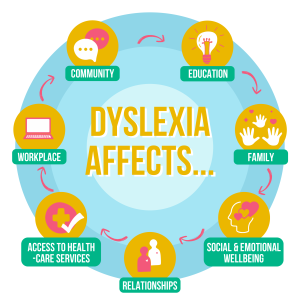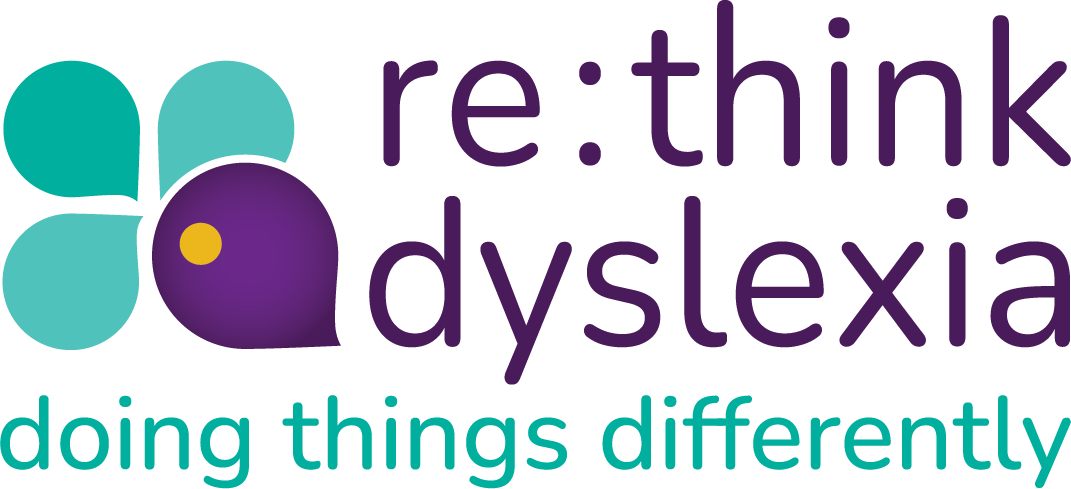
Dyslexia affects one in ten Australians, from the young through to the old, and is classified as a specific learning disability [1-4]. Dyslexics make up 50% of the neurodivergent population. It creates significant difficulty learning how to decode and read words because of struggles in processing the sounds of language and understanding letter patterns [4]. This has a flow on affect with reading speed, fluency comprehension and in turn impacts spelling and grammar.
Dyslexia can present differently for everyone. It is on a spectrum and affects various areas of our lives. Not only does it impact on our ability to read and express ourselves on paper, but it can also cause some odd and frustrating things like left right confusion to getting lost to reading and processing information slowly to poor organisation skills. As such, it can affect a person’s mental health and wellbeing. Research shows those with dyslexia face lower levels of mental health and wellness [5] including significant levels of depression, anxiety and mental exhaustion [5-7], and are 46% more likely to attempt suicide compared to the rest of the population [8].
Dyslexia is a lifelong hidden disability that you can’t see, and the general population doesn’t know enough about it. Consequently, it leaves us open to discrimination, harassment, and prejudice. It doesn’t change or go away no matter your educational level or the quality of teaching [4]. Early intervention is paramount in helping us improve our literacy skills, although we will never be the same level as someone who does not have dyslexia. We also know that dyslexia has nothing to do with our intelligence [9]! Many people with dyslexia tell me they have high IQs and I always feel somewhat disappointed because my IQ was just plain old average!
Through my work at re:think dyslexia I am working towards a global understanding of dyslexia to raise awareness of the challenges we face and the strengths we have. All human beings come with a set of challenges and strengths; that’s what makes every one of us unique and what makes our world so diverse. It is through variety that we thrive and so I hope that in time non-dyslexics accept our diverse way of thought, our creativity amongst and many other talents because we are all human beings. We only get one life, and we all deserve to live the best life possible.
If you need help as a dyslexic or you work with dyslexic employees, you can book a free 15 minute consultation with me today to find out more about the work we do and the help we can provide. Contact me at re:think dyslexia.
This blog is part of an exert taken from my book A Year in the Life of a Dyslexic Social Entrepreneur you can get your copy here
References
Leitao, S., et al., Exploring the impact of living with dyslexia: The perspectives of children and their parents. Int J Speech Lang Pathol, 2017. 19(3): p. 322-334.
- Snowling, J.M. and E.M. Hayiou-Thomas, The Dyslexia Spectrum: Continuities Between Reading, Speech, and Language Impairments. Topics in Language Disorders, 2006. 26(2): p. 110-126.
- Wagner, R.K., et al., The Prevalence of Dyslexia: A New Approach to Its Estimation. Journal of learning disabilities, 2020: p. 22219420920377-22219420920377.
- Lyon, G., S. Shaywitz, and B. Shaywitz, A definition of dyslexia. An Interdisciplinary Journal of The International Dyslexia Association, 2003. 53(1): p. 1-14.
- Wissell, S., L. Karimi, and T. Serry, Adults with dyslexia: A snapshot of the demands on adulthood in Australia. Australian journal of learning difficulties, 2021: p. 1-14.
- Wilson, A., et al., The mental health of Canadians with self-reported learning disabilities. Journal of Learning Disabilities, 2009. 42(1): p. 24-40.
- Wissell, S., et al., “You Don’t Look Dyslexic”: Using the Job Demands-Resource Model of Burnout to Explore Employment Experiences of Australian Adults with Dyslexia. International Journal of Environmental Research and Public Health, 2022. 19(17): p. 10719.
- Fuller-Thomson, E., S.Z. Carroll, and W. Yang, Suicide Attempts among Individuals with Specific Learning Disorders: An Underrecognized Issue. Journal of Learning Disabilities, 2018. 51(3): p. 283-292.
- Aaron, P.G., M. Joshi, and K.A. Williams, Not all reading disabilities are alike. Journal of Learning Disabilities, 1999. 32(2): p. 120-137.
